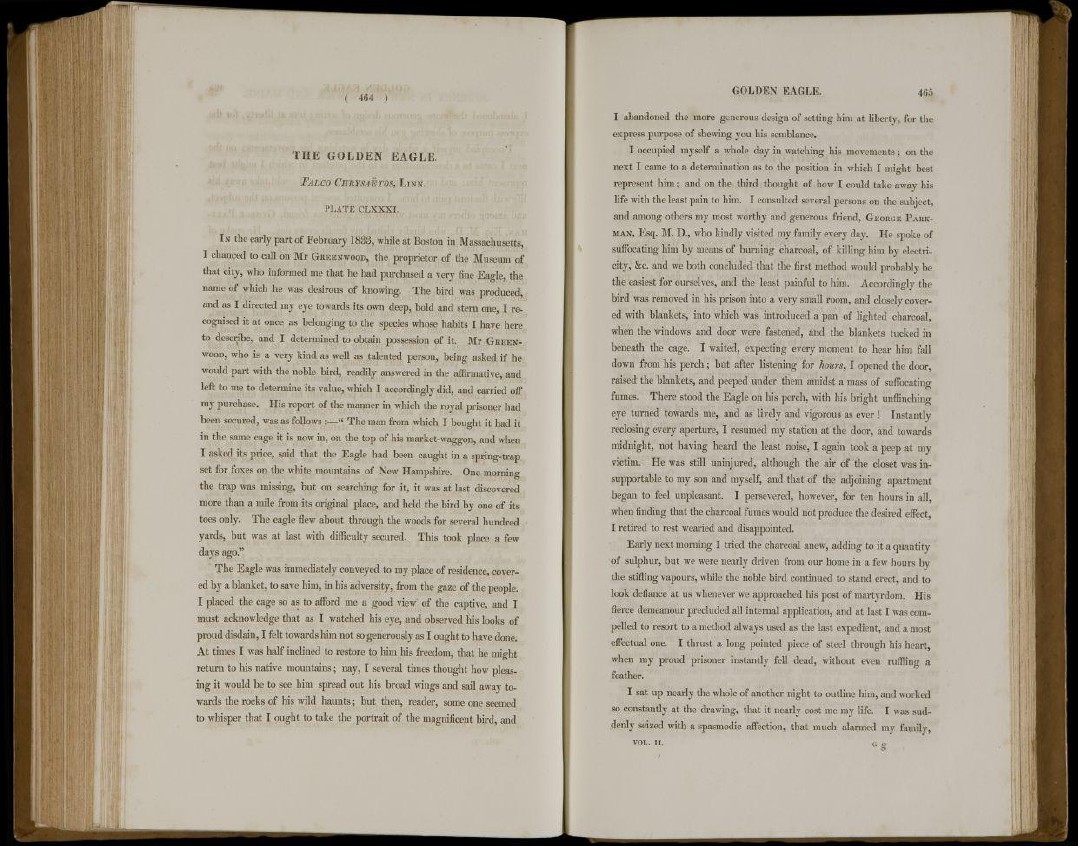
THE GOLDEN EAGLE.
FALCO CJIRYSAETOS, LINN,
P L A T E C L X X X I .
IN the early part of February 1833, while at Boston in Massachusetts,
I chanced to call on Mr GREENWOOD, the proprietor of the Museum of
that city, who informed me that he had purchased a very fine Eagle, the
name of which he was desirous of knowing. The bird was produced,
and as I directed my eye towards its own deep, bold and stern one, I recognised
it at once as belonging to the species whose habits I have here
to describe, and I determined to obtain possession of it. Mr GREENWOOD,
who is a very kind as well as talented person, being asked if he
would part with the noble bird, readily answered in the affirmative, and
left to me to determine its value, which I accordingly did, and carried off
my purchase. His report of the manner in which the royal prisoner had
been secured, was as follows :—" The man from which I bought it had it
in the same cage it is now in, on the top of his market-waggon, and when
I asked its price, said that the Eagle had been caught in a spring-trap
set for foxes on the white mountains of New Hampshire. One morning
the trap was missing, but on searching for it, it was at last discovered
more than a mile from its original place, and held the bird by one of its
toes only. The eagle flew about through the woods for several hundred
yards, but was at last with difficulty secured. This took place a few
days ago.'"
The Eagle was immediately conveyed to my place of residence, covered
by a blanket, to save him, in his adversity, from the gaze of the people.
I placed the cage so as to afford me a good view of the captive, and I
must acknowledge that as I watched his eye, and observed his looks of
proud disdain, I felt towards him not so generously as I ought to have done.
At times I was half inclined to restore to him his freedom, that he might
return to his native mountains; nay, I several times thought how pleasing
it would be to see him spread out his broad wings and sail away towards
the rocks of his wild haunts; but then, reader, some one seemed
to whisper that I ought to take the portrait of the magnificent bird, and
I abandoned the more generous design of setting him at liberty, for the
express purpose of shewing you his semblance.
I occupied myself a whole day in watching his movements; on the
next I came to a determination as to the position in which I might best
represent him; and on the third thought of how I could take away his
fife with the least pain to him. I consulted several persons on the subject,
and among others my most worthy and generous friend, GEORGE PARKMAN,
Esq. M. D., who kindly visited my family every day. He spoke of
suffocating him by means of burning charcoal, of killing him by electricity,
&c. and we both concluded that the first method would probably be
the easiest for ourselves, and the least painful to him. Accordingly the
bird was removed in his prison into a very small room, and closely covered
with blankets, into which was introduced a pan of lighted charcoal,
when the windows and door were fastened, and the blankets tucked in
beneath the cage. I waited, expecting every moment to hear him fall
down from his perch; but after listening for hours, I opened the door,
raised the blankets, and peeped under them amidst a mass of suffocating
fumes. There stood the Eagle on his perch, with his bright unflinching
eye turned towards me, and as lively and vigorous as ever ! Instantly
reclosing every aperture, I resumed my station at the door, and towards
midnight, not having heard the least noise, I again took a peep at my
victim. He was still uninjured, although the air of the closet was insupportable
to my son and myself, and that of the adjoining apartment
began to feel unpleasant. I persevered, however, for ten hours in all,
when finding that the charcoal fumes would not produce the desired effect,
I retired to rest wearied and disappointed.
Early next morning I tried the charcoal anew, adding to it a quantity
of sulphur, but we were nearly driven from our home in a few hours by
the stifling vapours, while the noble bird continued to stand erect, and to
look defiance at us whenever we approached his post of martyrdom. His
fierce demeanour precluded all internal application, and at last I was compelled
to resort to a method always used as the last expedient, and a most
effectual one. I thrust a long pointed piece of steel through his heart,
when my proud prisoner instantly fell dead, without even ruffling a
feather.
I sat up nearly the whole of another night to outline him, and worked
so constantly at the drawing, that it nearly cost me my life. I was suddenly
seized with a spasmodic affection, that much alarmed my family,
VOL. ii. t; <r